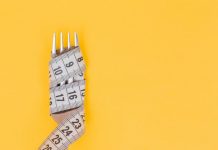Low carb diets have a 95% fail rate. Restrictive calorie diets leave dieters with slow metabolism, muscle loss and feelings of deprivation.
What’s worse than suffering through a low calorie diet and feeling deprived in order to lose weight? Gaining all the weight back and failing at the diet. That’s exactly what happens to 95% of the dieters who try a calorie restrictive diet. According to the Tufts-New England Medical Center, 21% of dieters drop out of a low calorie diet within the first two months and 45% drop out within the first year. Within three to five years, nearly everyone regains the weight they lost while following a calorie restrictive diet.
Table of Contents
Why Doesn’t a Calorie Restriction Diet Work for Weight Loss?
There are several reasons calorie restriction diets don’t work. The first is that eating fewer calories leaves dieters feeling hungry. Prolonged hunger is the main reason most people fail at calorie restrictive diets. Hunger often leads to binge eating and causes them to regain any weight they lost while following the low carb diet. Furthermore, feeling deprived causes dieters to fall off the bandwagon. These diets also foster an obsession with food that can lead increase the risk of an eating disorder. The more restrictive the diet, the more likely people are to fail.
The second reason calorie restriction diets don’t work is because once calories are cut, the body conserves energy and metabolism slows down. This is the opposite effect as what we want since a higher metabolism burns more fat. Another reason metabolism slows down during a calorie restrictive diet is that muscle is being lost as well. The body uses fat and muscle tissue for energy when calories are being restricted.
Hitting a plateau is another reason dieters fail at calorie restrictive diets. Such a diet can help people lose some weight in the beginning, but over time the body adjusts to the lower amount of calories. A few months into the diet, even the most diligent dieters often face a weight loss plateau that is difficult to push past.
How to Avoid Diet Pitfalls
There are a few things dieters can do to assure diet success and lose weight in a healthy way. First is to make sure that the foods they eat are nutritious. Eat a variety of foods and try to get the most nutrition for your buck out of every meal. Include plenty of lean protein in your diet to help maintain muscle mass and repair the body. A diet high in protein and fiber is filling and satisfying, making it easier to stick to over time.
Strength training is another way to maintain and develop muscle. Using resistance training allows dieters to burn more fat and fire up their metabolism. Regularly switching up the strength training routine and changing the intensity of the workout prevents the body from adjusting to it and hitting a plateau.
A calorie restrictive diet might seem like a common sense approach to weight loss, but the consequences of nutrition deficiency can be seen over time and can lead to osteoporosis, decreased libido, depression or premature death, aside from being an ineffective weight loss plan.



